"Devs Explain Console 'Eslop' Overload and Potential Game Takedowns"
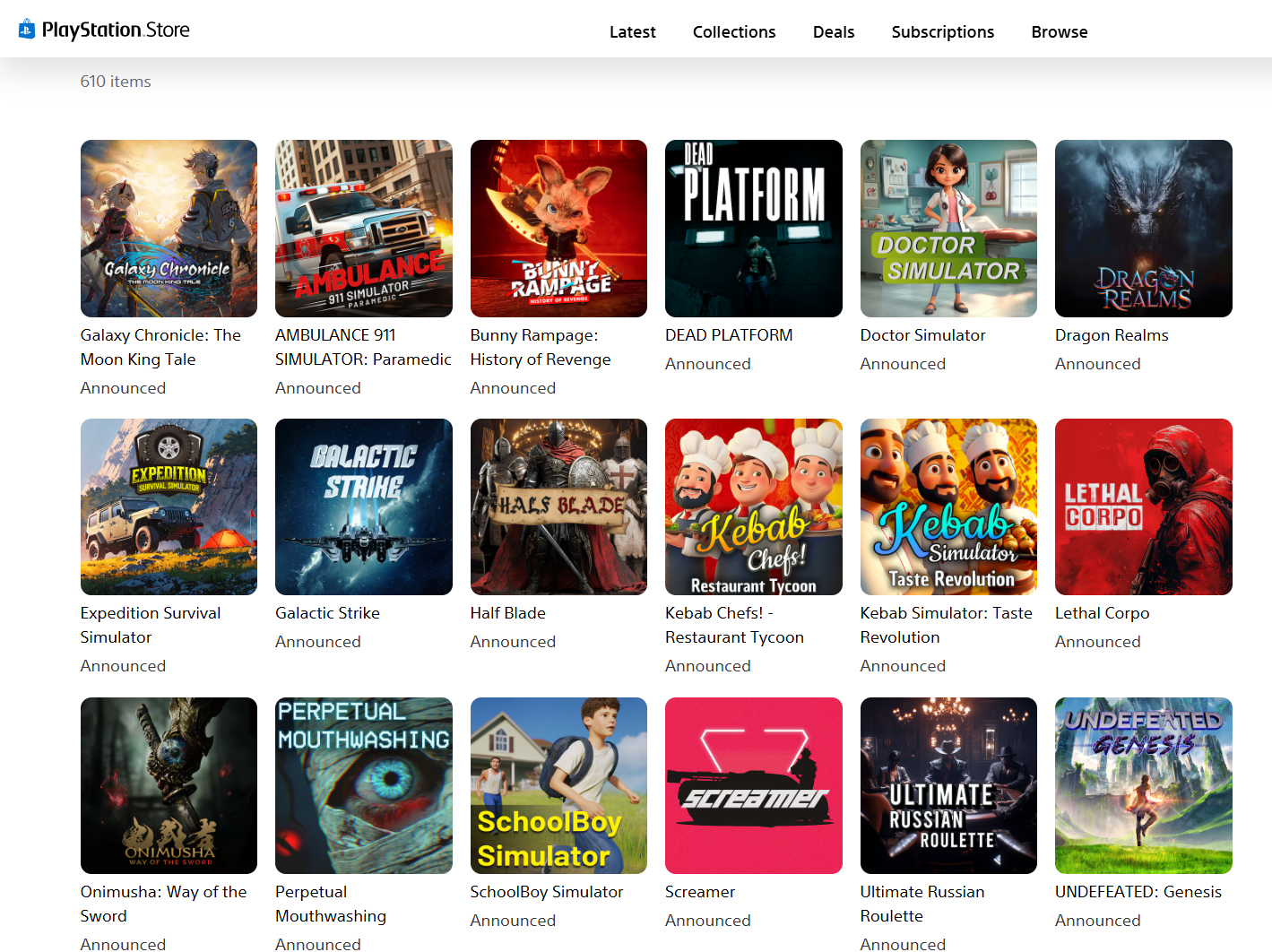
Over the past few months, the PlayStation Store and Nintendo eShop have been inundated with what users are dubbing "slop." This term refers to a surge of low-quality games that use generative AI and misleading store pages to deceive consumers into buying substandard products. Publications like Kotaku and Aftermath have highlighted this issue, particularly on the Nintendo eShop, where these games are aggressively advertised. The problem has extended to the PlayStation Store, notably affecting the "Games to Wishlist" section with a proliferation of odd-looking titles.
These "slop" games aren't just poor quality; they're part of a deluge that overwhelms the platforms, often being simulation games that are perpetually on sale. They mimic popular themes or outright copy concepts and names, and their promotional materials often feature hyper-stylized art and screenshots that appear to be generated by AI. In reality, these games are janky, with poor controls, technical issues, and minimal engaging content. The situation is exacerbated by a small number of companies that churn out these games, often evading accountability by frequently changing names and maintaining minimal online presence, as noted by YouTube creator Dead Domain.
The growing frustration among users has led to calls for stricter regulation on these storefronts to curb the influx of "AI slop." This is especially pressing given the performance complaints about the Nintendo eShop, which has become increasingly slow and cluttered.
The Magical World of Cert
To understand why these games are flooding the stores, I spoke with eight anonymous individuals involved in game development and publishing. They explained the process of getting a game onto major storefronts like Steam, Xbox, PlayStation, and Nintendo Switch. Generally, developers or publishers must pitch their game to gain access to development backend portals and devkits. They then fill out forms detailing the game's features and undergo a certification process to ensure the game meets platform-specific technical requirements. However, these requirements focus on technical compliance rather than game quality, and platforms like Nintendo and Sony do not publicly disclose their certification criteria.
The certification process also checks for legal compliance and adherence to ESRB ratings, but it's not a quality assurance check. If a game fails certification, it's sent back to the developer for fixes, though platform holders often provide vague feedback, making it challenging to resolve issues, especially with Nintendo.
Front and Center
Regarding store pages, platform holders require accurate screenshots, but the review process is more about ensuring no competing imagery or incorrect language is used rather than verifying the game's representation. One developer recounted a case where Nintendo caught a discrepancy in screenshots, but such incidents are rare. Nintendo and Xbox review store page changes before they go live, while PlayStation does a single check near launch, and Valve reviews pages initially but not afterward.
The standards for what constitutes an accurate game representation are loosely defined, allowing many games to slip through. Misleading content usually results in a request to remove it rather than severe penalties, and there are no rules against using generative AI on console storefronts, though Steam requires disclosure of its use.
Eshop to eslop
The reasons for the flood of misrepresented games on Nintendo and Sony's platforms, compared to the lesser impact on Xbox and Steam, are multifaceted. Microsoft vets games on a per-game basis, making it harder for low-quality games to proliferate. In contrast, Nintendo, Sony, and Valve approve developers once, allowing them to release multiple games if they pass certification.
Some developers exploit this system, continuously releasing new bundles to stay at the top of sales and new release lists, pushing out more deserving games. PlayStation's "Games to Wishlist" section, sorted by release date, exacerbates the issue by promoting unreleased games with vague release windows.
While generative AI contributes to the problem, it's not the sole issue. The real challenge lies in discoverability, with Xbox's curated store pages helping to mitigate the issue. Steam, despite having many potential "slop" games, offers robust sorting and searching options, and its new releases section refreshes frequently, diluting the impact of low-quality games.
Nintendo's approach to sorting new releases as a jumbled mess further complicates the issue.
All Games Allowed
Users have been urging Nintendo and Sony to address the "slop" issue, but neither responded to requests for comment on any planned actions. Developers and publishers are skeptical about significant improvements, particularly with the upcoming Nintendo Switch 2. However, it's noted that Nintendo's web browser eShop is more user-friendly and less affected by "slop."
Sony has previously taken action against similar issues, as seen in 2021 when they cracked down on "spam" content. Yet, aggressive platform regulation can lead to unintended consequences, as demonstrated by Nintendo Life's "Better eShop" initiative, which faced backlash for incorrectly categorizing games.
Some developers express concern that overly stringent quality controls could harm legitimate games. They emphasize that platform holders, staffed by people, face the challenge of distinguishing between various types of submissions while trying to balance openness with preventing cynical cash grabs.
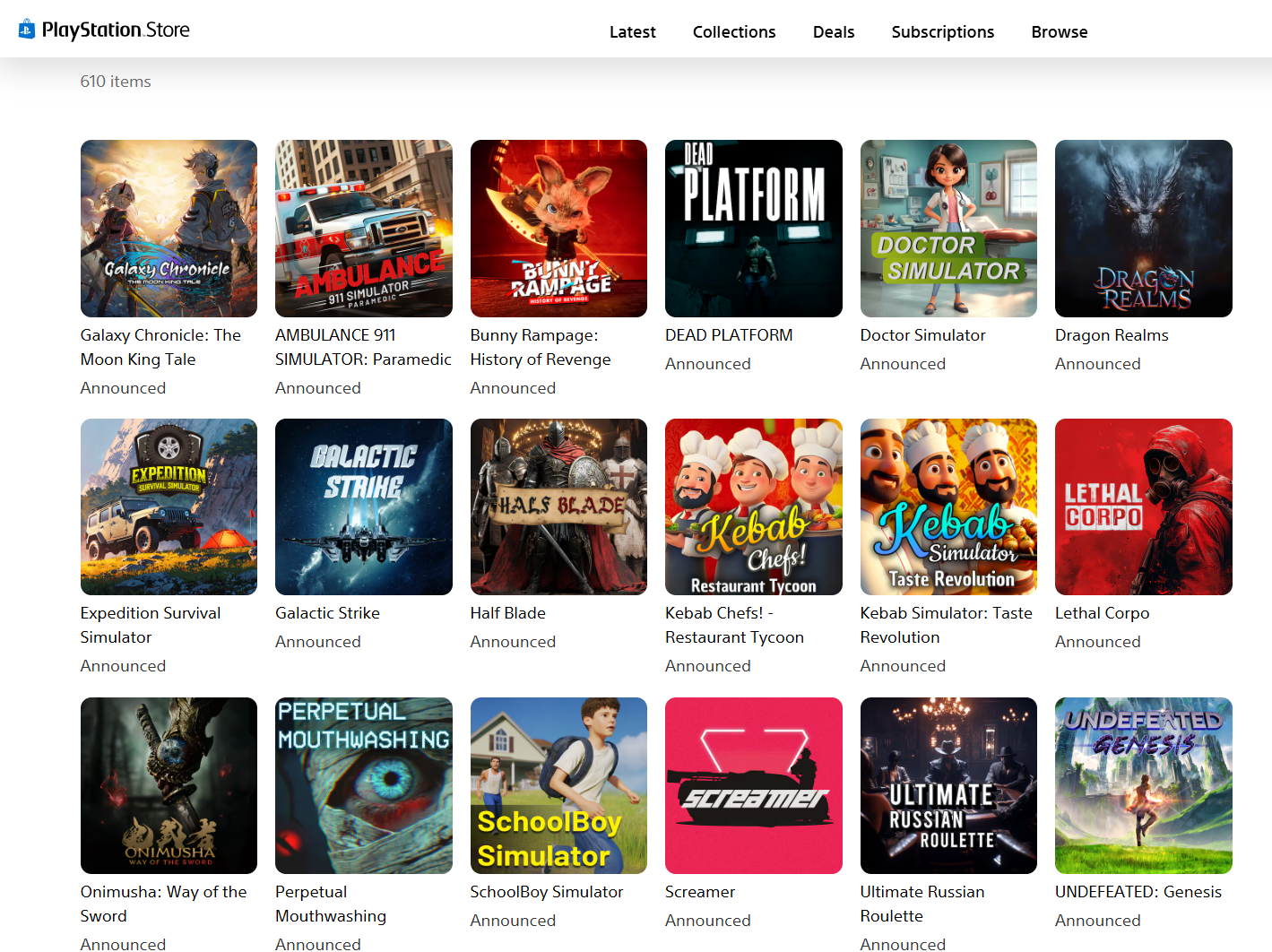
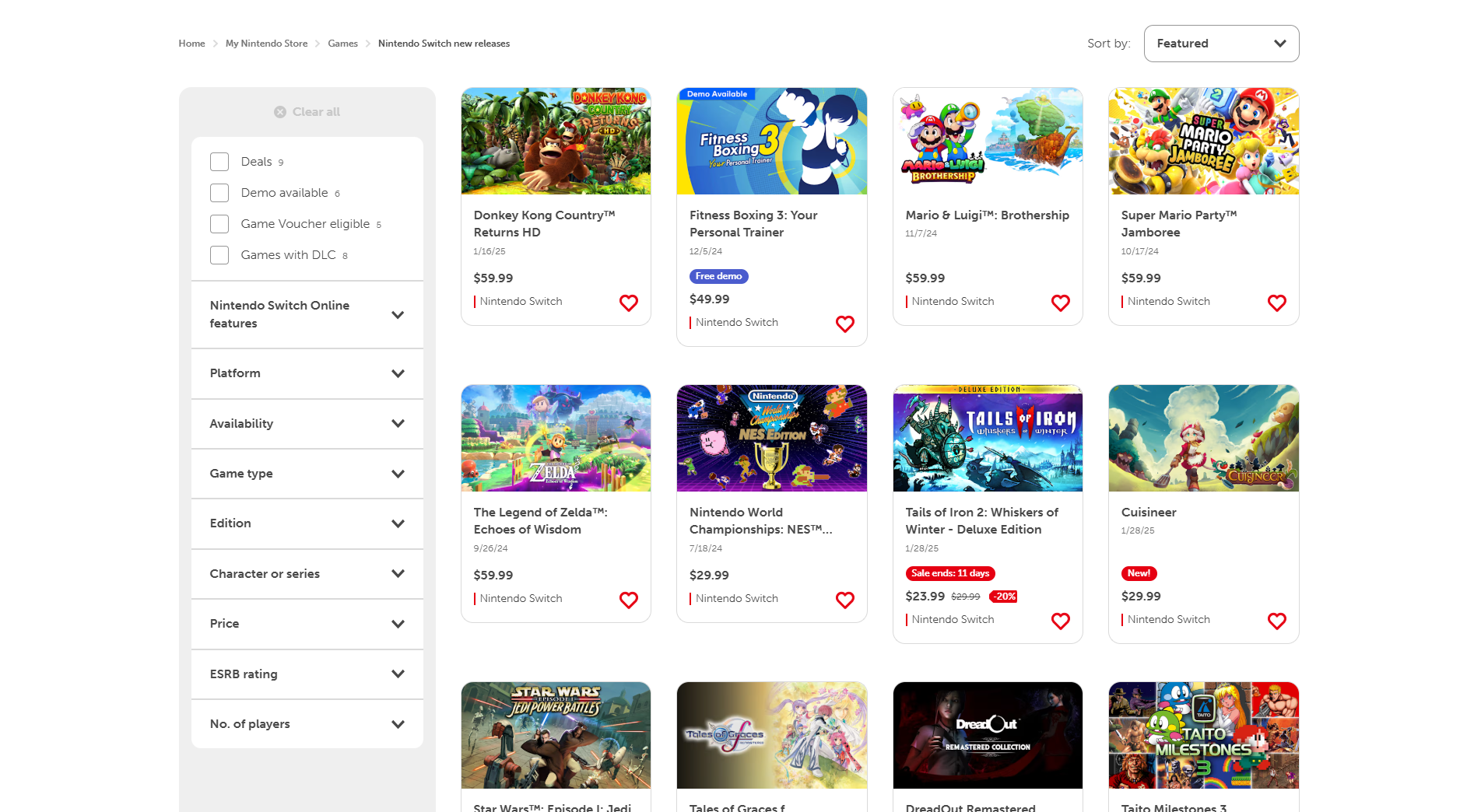
-
 hair FELICEThe official "FELICE" app is now available!Introducing the official FELICE application – now live!This app keeps you updated with FELICE's latest news and offers essential features at your fingertips.[App Features]Here's what you can do with the app:
hair FELICEThe official "FELICE" app is now available!Introducing the official FELICE application – now live!This app keeps you updated with FELICE's latest news and offers essential features at your fingertips.[App Features]Here's what you can do with the app: -
 MARVEL DuelIntroducing the Fantastic 4 DeckNew Release: Fantastic 4 ExpansionUnleash extraordinary power to reshape the Marvel universe! MARVEL Duel is a dynamic strategy card game showcasing legendary Super Heroes and Villains. A sinister force has twisted Mar
MARVEL DuelIntroducing the Fantastic 4 DeckNew Release: Fantastic 4 ExpansionUnleash extraordinary power to reshape the Marvel universe! MARVEL Duel is a dynamic strategy card game showcasing legendary Super Heroes and Villains. A sinister force has twisted Mar -
 بوكر تكساس الاحترافيةExperience professional Texas Poker with daily prizes and gifts awaiting you! Join now!Texas Poker Professional Mobile: This free game brings together millions of Arab players from across the region, regarded as one of the finest Arabic poker games a
بوكر تكساس الاحترافيةExperience professional Texas Poker with daily prizes and gifts awaiting you! Join now!Texas Poker Professional Mobile: This free game brings together millions of Arab players from across the region, regarded as one of the finest Arabic poker games a -
 Apple TVEnjoy Apple TV+, movies, and endless entertainment.The Apple TV app is your destination for Apple TV+, MLS Season Pass, and much more.With the Apple TV app, you can:Stream award-winning Apple Originals on Apple TV+, including hits like The Morning Sh
Apple TVEnjoy Apple TV+, movies, and endless entertainment.The Apple TV app is your destination for Apple TV+, MLS Season Pass, and much more.With the Apple TV app, you can:Stream award-winning Apple Originals on Apple TV+, including hits like The Morning Sh -
 Font SuitProfessional font design services by Akanksha RawatHave you ever wanted to sell your own fonts in the marketplace? You've come to the right place. I create custom fonts tailored to your needs. All services include a commercial license, making the fon
Font SuitProfessional font design services by Akanksha RawatHave you ever wanted to sell your own fonts in the marketplace? You've come to the right place. I create custom fonts tailored to your needs. All services include a commercial license, making the fon -
 FlySmartA mobile application developed by the Malaysian Aviation Commission (MAVCOM)Travel with confidence, knowing your air passenger rights are safeguarded with the new FlySmart mobile app.The Malaysian Aviation Commission (MAVCOM) is pleased to elevate yo
FlySmartA mobile application developed by the Malaysian Aviation Commission (MAVCOM)Travel with confidence, knowing your air passenger rights are safeguarded with the new FlySmart mobile app.The Malaysian Aviation Commission (MAVCOM) is pleased to elevate yo
-
 Marvel Rivals Season 1 Release Date Revealed
Marvel Rivals Season 1 Release Date Revealed
-
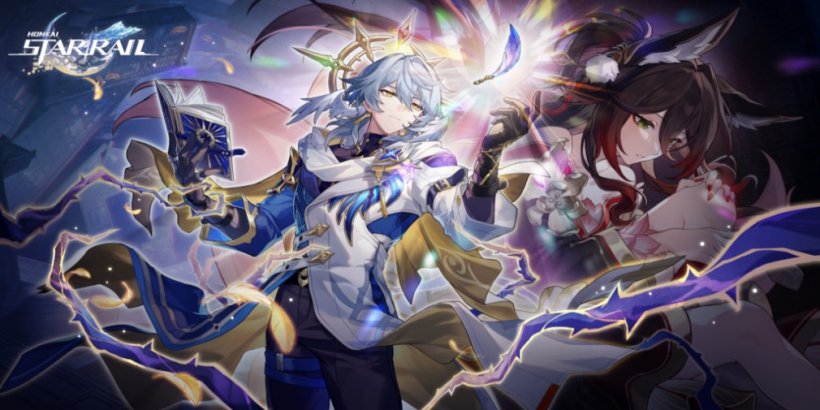 Honkai: Star Rail Update Unveils Penacony Conclusion
Honkai: Star Rail Update Unveils Penacony Conclusion
-
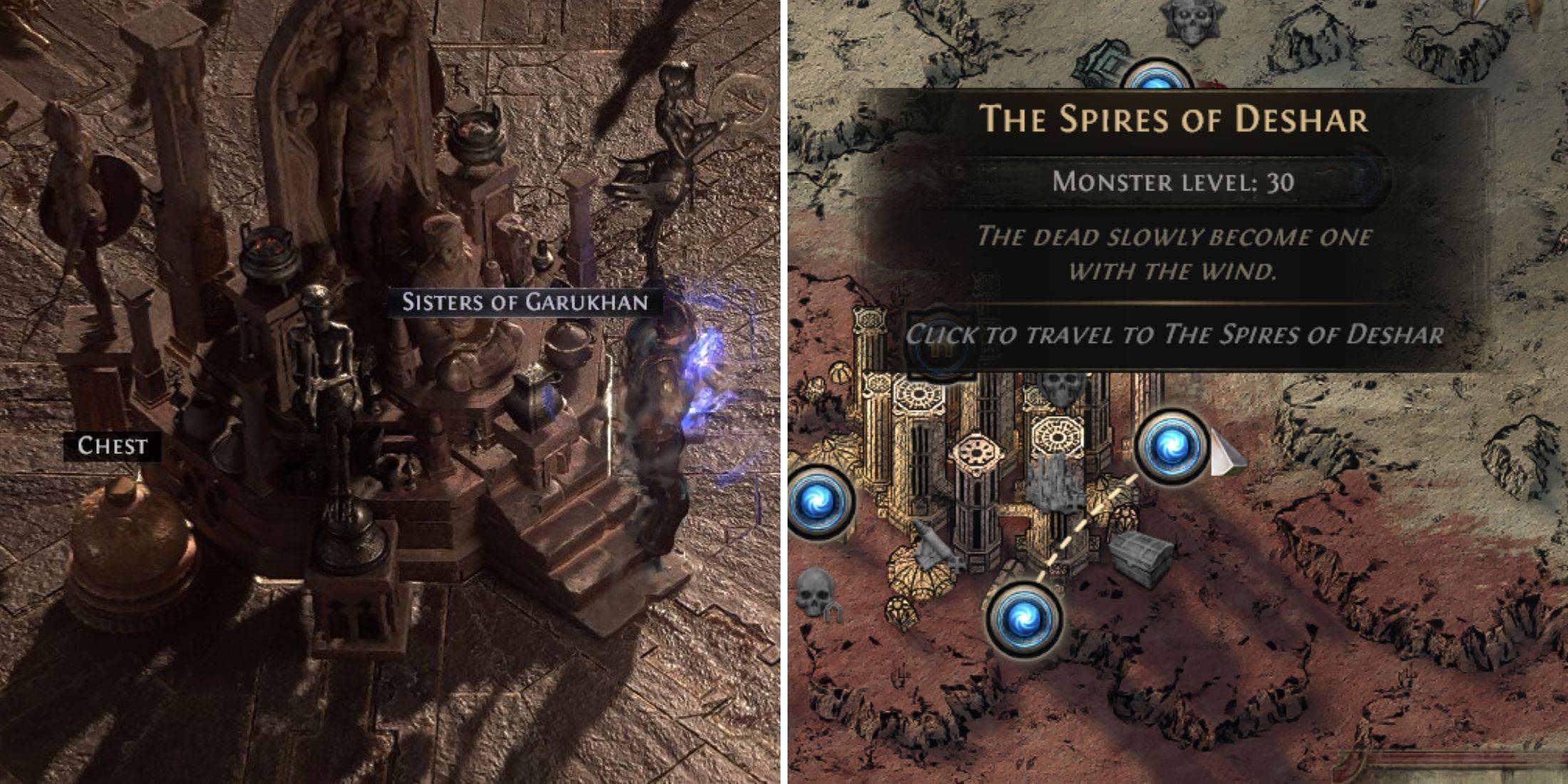 Announcing Path of Exile 2: Guide to Sisters of Garukhan Expansion
Announcing Path of Exile 2: Guide to Sisters of Garukhan Expansion
-
 Sonic Racing: CrossWorlds Characters and Tracks Revealed for Upcoming Closed Network Test
Sonic Racing: CrossWorlds Characters and Tracks Revealed for Upcoming Closed Network Test
-
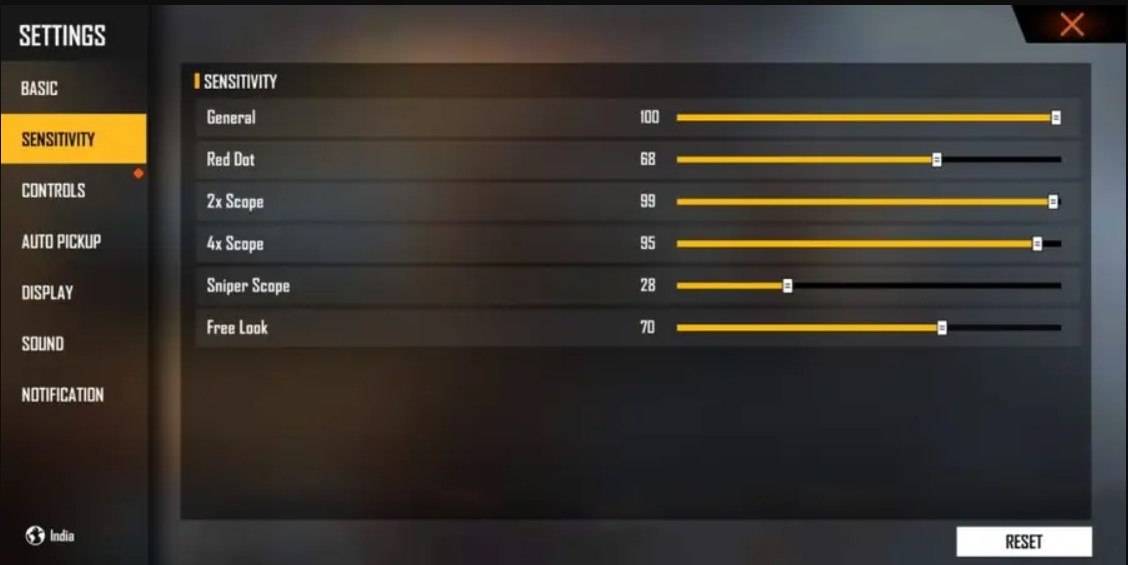 Optimal Free Fire Settings for Headshot Mastery
Optimal Free Fire Settings for Headshot Mastery